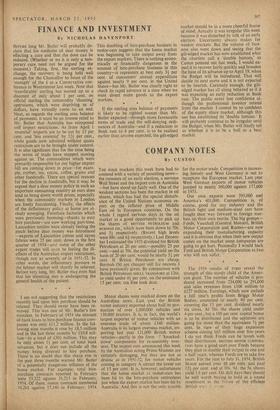FINANCE AND INVESTMENT
By NICHOLAS
DAVENPORT
BEFORE long Mr. Butler will probably de- clare that his medicine of dear money is
effecting a cure and that the dose can be reduced. (Whether or no it is only a tem- porary cure need not be argued for the moment.) Taking, first, the sterling ex- change, the recovery is being held well enough for the Chancellor to boast of the 'strength' of the £ at a Conservative con- ference in Westminster last week. Now that 'transferable' sterling has moved up to a discount of only about 1 per cent, on official sterling the commodity 'shunting' operations, which were depriving us of dollars, have virtually come to an end. Next, as regards the sterling area balance of payments, it must be an intense relief to Mr. Butler that Australia has reimposed stiff import restrictions. As from April 1 'essential' imports are to be cut by 15 per cent. and 'less essential' by 33+ per cent., while goods now admitted without quota restriction are to be brought under control. It is also significant that for the time being the terms of trade have stopped moving against us. The commodities which were primarily responsible for our higher import bill are coming down in price—for exam- ple, rubber, tea, cocoa, coffee, grains and other foodstuffs. There are special reasons for the decline in foodstuffs, but it may be argued that a dear money policy in such an important consuming country as ours does tend to bring down world prices, especially when the commodity markets in London are freely functioning. Finally, the effects of the deflationary policy at home are al- ready emerging. Furniture factories which were previously booming—thanks to easy hire purchase—are now working part-time. Lancashire textiles were already feeling the pinch before dear money was introduced —exports of Lancashire cotton and rayon fabrics were 25 per cent, down in the first quarter of 1954—and some of the other export trades will soon be feeling the ill- effects of the Australian import restrictions, though not as severely as' in 1951-52. In other words, the inflationary pressure in the labour market will shortly be relieved. Before very long, Mr. Butler may even find that his slimming diet is endangering the general health of the patient.
• I am not suggesting that the restrictions recently laid upon hire purchase should be relaxed. They should never have been re- moved. This was one of Mr. Butler's few mistakes. In February of 1954 the amount of bank loans to hire-purchase finance com- panies was only £11.2 million. In the fol- lowing nine months it rose by £8.5 million and in the last three months by £10.8 mil- lion—to a total of £301 million. This may be only about 1 f per cent, of total bank advances, but it does not include all the money being diverted to hire purchase. There is no doubt that this sharp rise in the past three months warned Mr. Butler of a potentially dangerous inflation of the home market. For example, total hire- purchase contracts reported in February were 53,322 against 31,215 in February, 1954. Of these, motor contracts numbered 34.261 against 17,180 in February, 1954. This doubling of hire-purchase business in mofor-cars suggests that the home market was beginning to take output away from the export markets. There is nothing econo- mically or financially dangerous in the amount of hire-purchase business in this country—it represents at best only 31 per cent. of consumers' annual expenditure against nearly 9 per cent. in the United States—but Mr. Butler was clearly right to check its rapid advance at a time when we must divert more goods to the export markets.
If the sterling area balance of payments is likely to be righted sooner than Mr. Butler expected—through more favourable terms of trade and the self-denying ordi- nances of Australia—and if a reduction in Bank rate to 4 per cent. is to be realised earlier than anyone expected, the gilt-edged market should be in a more cheerful frame of mind. Actually it was irregular this week because it was disturbed by talk of an early election. Uncertainty always makes for weaker markets. But the volume of busi- ness also went down and seeing that the gilt-edged market has now established what the chartists call a 'double bottom,' as Custos pointed out last week, I would ex- pect it to recover fairly quickly and broaden the base of its advance up to April 19, when the Budget will be introduced. That will decide its next move and it is not expected to be bearish. Curiously enough, the gilt- edged market has all along behaved as if it was expecting an early reduction in Bank rate. The public never lost confidence al- though the professional investor retired frofn the market. I cannot be so confident of the equity share market, although this too has established its 'double bottom.' It will probably continue to be irregular until the Budget, when Mr. Butler will finally tell us whether it is to be a bull or a bear market.


































 Previous page
Previous page